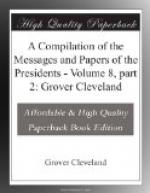Under these circumstances I have been urgently solicited to establish by military power courts to administer summary justice in such cases. I have thus far declined to do it, not because I had any doubt that the end proposed—the collection of the debts—was just and right in itself, but because I have been unwilling to go beyond the pressure of necessity in the unusual exercise of power. But the powers of Congress, I suppose, are equal to the anomalous occasion, and therefore I refer the whole matter to Congress, with the hope that a plan may be devised for the administration of justice in all such parts of the insurgent States and Territories as may be under the control of this Government, whether by a voluntary return to allegiance and order or by the power of our arms; this, however, not to be a permanent institution, but a temporary substitute, and to cease as soon as the ordinary courts can be reestablished in peace.
It is important that some more convenient means should be provided, if possible, for the adjustment of claims against the Government, especially in view of their increased number by reason of the war. It is as much the duty of Government to render prompt justice against itself in favor of citizens as it is to administer the same between private individuals. The investigation and adjudication of claims in their nature belong to the judicial department. Besides, it is apparent that the attention of Congress will be more than usually engaged for some time to come with great national questions. It was intended by the organization of the Court of Claims mainly to remove this branch of business from the halls of Congress; but while the court has proved to be an effective and valuable means of investigation, it in great degree fails to effect the object of its creation for want of power to make its judgments final.
Fully aware of the delicacy, not to say the danger, of the subject, I commend to your careful consideration whether this power of making judgments final may not properly be given to the court, reserving the right of appeal on questions of law to the Supreme Court, with such other provisions as experience may have shown to be necessary.
I ask attention to the report of the Postmaster-General, the following being a summary statement of the condition of the Department:
The revenue from all sources during the fiscal year ending June 30, 1861, including the annual permanent appropriation of $700,000 for the transportation of “free mail matter,” was $9,049,296.40, being about 2 per cent less than the revenue for 1860.
The expenditures were $13,606,759.11, showing a decrease of more than 8 per cent as compared with those of the previous year and leaving an excess of expenditure over the revenue for the last fiscal year of $4,557,462.71.
The gross revenue for the year ending June 30, 1863, is estimated at an increase of 4 per cent on that of 1861, making $8,683,000, to which should be added the earnings of the Department in carrying free matter, viz, $700,000, making $9,383,000.




